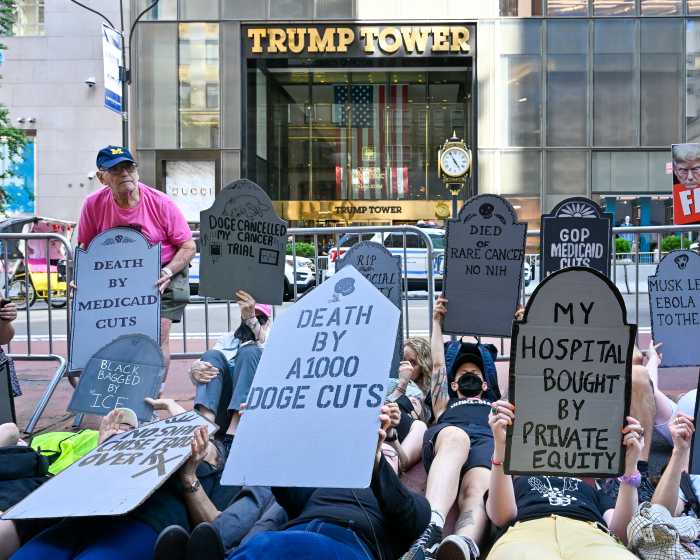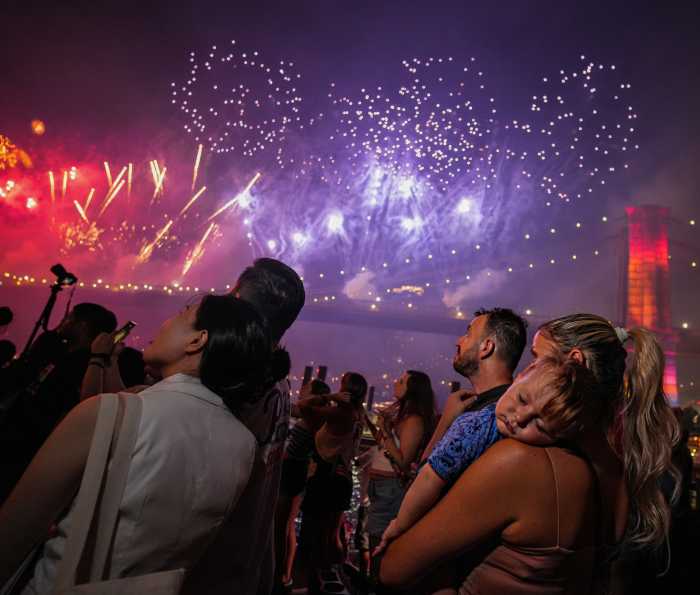
Site of 11 Sixth Ave., where restaurateur Gregory Nardello has permission to build an enclosed sidewalk café at his yet unnamed restaurant.
BY DUSICA SUE MALESEVIC | The City Council approved an enclosed sidewalk cafe for a Tribeca restaurant last month — despite Community Board 1’s opposition.
The board rejected the application at its November meeting and when its Tribeca Committee met last month, Chairperson Peter Braus said, “I don’t even know why we consider these applications. I don’t even know why we waste our time because, at this point … they don’t even care.”
In January, six members of the council’s subcommittee of zoning and franchises approved the application of owner Gregory Nardello to build an enclosed sidewalk cafe at 11 Sixth Ave.
Mark Weprin, a city councilmember representing part of Queens, chairs the subcommittee. His office did not respond to Downtown Express calls and emails.
Alice Blank, a board member, said the Council’s move will have permanent consequences.
“What makes this very special and why I was a little more involved than usual is that this is a permanent exterior, 200-square-foot building that is going on the sidewalk on our neighborhood, which is unprecedented since 1970 with a Delphi,” said Blank, an architect, referring to a restaurant that has since closed.
“It is not something that is at all enhancing the neighborhood,” she added.
The application came before the Tribeca Committee, which passed a resolution against approval, on Nov. 12. Concerning both enclosed and unenclosed sidewalk cafes, the committee has a policy to wait until the restaurant has been operating for a “reasonable period of time” before approval.
It was also rejected at the full board meeting on Nov. 20, with the understanding that the applicant could reapply.
Nardello, who also owns the restaurant Augurs Well in the East Village, can now build the enclosure, which will have six tables and 26 seats. He did not respond to Downtown Express calls for comment.
He did, however, agree to some community-based stipulations, according to a spokesperson for Councilmember Margaret Chin. In a Jan. 12 letter to Chin, Nardello said that “in light of concerns of the surrounding community,” his company 11 Food and Beverage, Inc. will not pursue a cabaret license and the windows of the enclosed cafe will be closed by 8 p.m. That closing time can be revisited with C.B. 1 and neighbors after a year.
He also will provide his number as well as manager’s to C.B. 1 and the neighbors.
The agreement was the result of the work of Chin’s office, C.B. 1 members and the neighbors who live near the restaurant, said the spokesperson, Sam Spokony.
Michael Levine, who worked for the City Planning Commission for decades and is the consulting planner for C.B. 1, explained that it is written into zoning legislation where enclosed and unenclosed sidewalks are permitted.
“The City Council is very reluctant to say ‘no’ if the zoning legislation says ‘yes,’ “ said Levine. “They’ve been hurt once before. Once when the City Council voted against a sidewalk cafe, unenclosed, because the community board objected to it. The proprietor took them to court, sued the City Council” and won, getting their cafe, said Levine.
He said that he has suggested to the board a tactic, which is not an easy route to travel but could work, to ask the City Planning Commission to reconsider the streets on which the zoning resolution says enclosed sidewalk cafes are permitted.
But, “I think we have a difference of opinion in this board as to where to go next,” he said.
“I think sidewalk cafes are great, it’s a wonderful amenity,” said Blank, “but the idea of a permanent enclosed piece, which this is, it’s entry through the structure of the building and you cannot easily get rid of this thing. If we made a mistake, it’s there for a long time. I think we’ve also opened a tremendous cans of worms here.”
Brand said that applicants that appear before the board could simply not take their opposition very seriously, move on, and still get an enclosed sidewalk cafe.
“You can imagine that Tribeca will become the Upper West Side, because ultimately you could imagine that we’ll have floods of these glass and steel structures on the street,” said Blank.
Not every committee member thought that enclosed sidewalk cafes were a problem.
Adam Malitz pointed out that the last enclosed sidewalk cafe was Delphi. He did not think there would be a “gold rush.”
In light of the fact that they rarely get complaints about sidewalk cafes and it hasn’t been an issue in terms of renewals, Malitz said that there were other pressing issues to focus on.
Shlomo “Steve” Wygoda, the architect of the enclosed sidewalk cafe in question and public member of the Tribeca Committee who recused himself from the vote, told members that in the past 40 years, he has done 750 sidewalk cafes and only 12 of them applied for enclosed.
When a client calls him about sidewalk cafes, typically it is unenclosed because it is very expensive to build an enclosure and pay fees, said Wygoda, president and founder of SWA Architecture.
According to website of the Dept. of Consumer Affairs, there is a $510 fee for a two-year license. In addition, for an enclosed sidewalk cafe, the owner must pay a $4,000 security deposit and another $55 per seat, for a $1,360 minimum.
“This mad rush will not happen,” said Wygoda. “If this community feels strong enough to prevent enclosed cafes in Tribeca but not other parts of C.B. 1 because other parts could use some of that, then there is a legal way to do it through City Planning.”
The committee decided to start a sidewalk cafe taskforce. Blank will be chairperson with Jeff Ehrlich as co-chairperson. Levine will also work with the group, which is slated to meet on Wed., Feb. 18.
C.B. 1 Chairperson Catherine McVay Hughes said in an email that the sidewalk cafe working group will discuss both enclosed and unenclosed sidewalk cafe regulations in each part of the board’s district.
In addition, the board did a summary of last year’s applications and as expected, said Hughes, the majority of sidewalk cafe applications were in Tribeca.


































